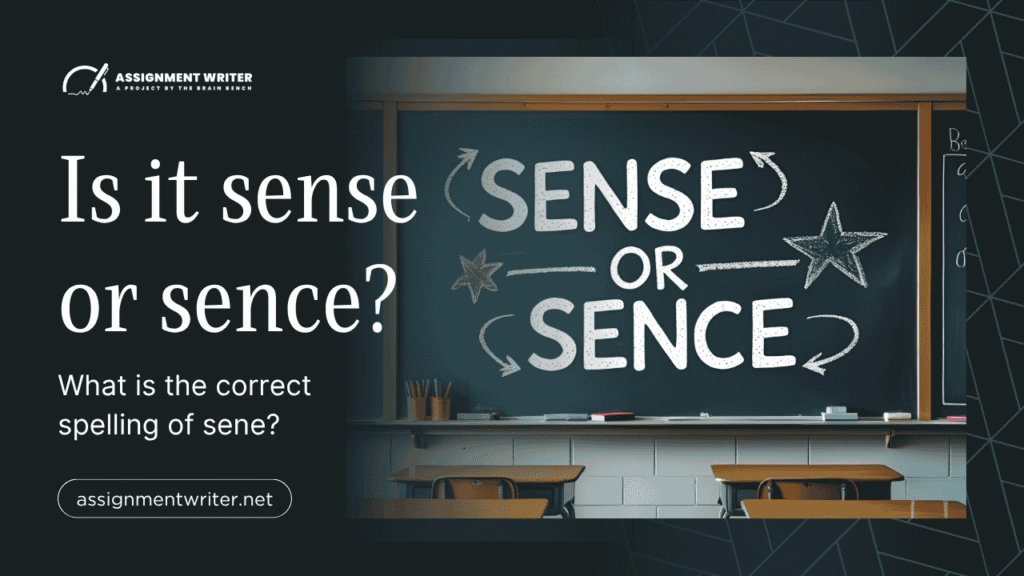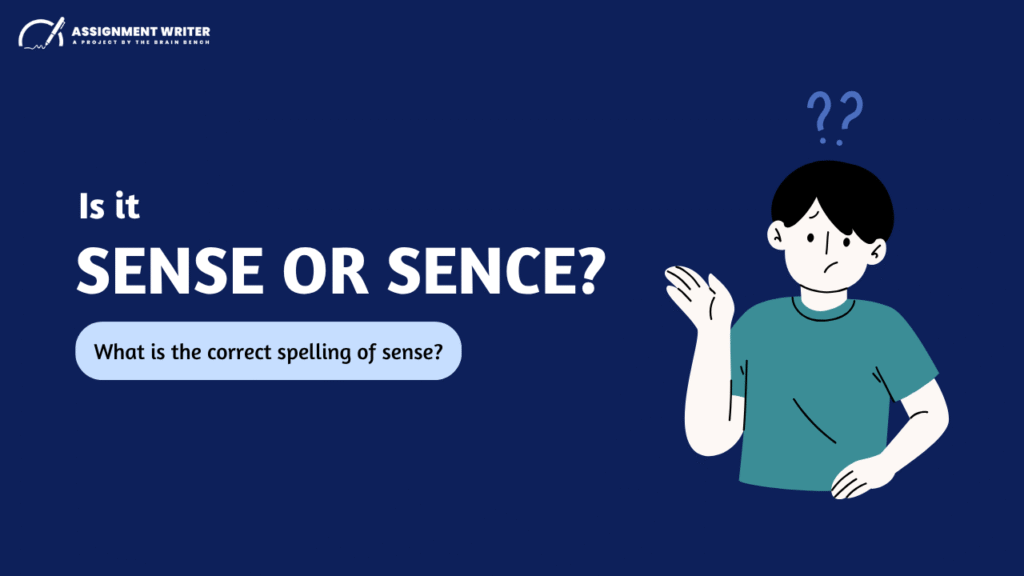Is it Sense or Sence? What Is The Correct Spelling
Table of Contents
Toggle
It’s common to mix up the terms “sense or sence”. The word “sense” should be spelled and used instead of “sence”. The word “Sence” is a common misspelling in linguistics, and it is never correct in meaning when used in English sentences.
In the English language, learning how to spell words correctly may be highly complicated. There are many words in linguistics with the same pronunciation but incorrect spelling in grammar. Such types of spelling errors arise because certain words are similar among different languages.
These words have the same sound but have different arrangements or combinations of English letters. “Sense or Sence” is one example of this. If you are searching is it “common sense” or “common sence”, this blog is for you. Let us first see what makes sense between them.
What is the correct spelling of sense?
The etymology of the word sense dates back to late 14th century in the French and Latin languages. In Old French sens is a noun, that is, one of the five senses. It means perception or feeling in Latin, where it is called sensus. It bears a similarity also with the Italian word sentire which means to perceive.
In English, sense is both a noun and a verb. It signifies “awareness” or “judgment” when used as a noun. As a verb that implies “to perceive something” or “feeling something”.

The odd location of the s in the middle instead of a c makes the difference between a sense and a sence in the English language. Thus the manner in which he/she spells it, with c being in the middle, is not the correct one. The usage of a misspelled word is, however, extremely popular, depending on the regions and contexts.
The forms of such words with the similar pronunciation and wrong choice of spelling in standard English are numerous. Some examples are “definately” vs “definitely”, “angel vs angle“, “beleive” vs “believe”, “Dependant vs Dependent“, and “adress vs address”.
Is the phrase make sence or sense?
The word sense can be used in expressions like “makes sense” or “make sence.” When used in this way, it shows something is logical and reasonably right.
The expression make sense or makes sense can be used as it is or it can be modified by a determiner or an objective (eg, “complete”, “total”, “perfect”, “logical” and, “absolute”) to emphasize a statement.
The phrase “Makes (s) sence” when spelled with a “c” instead of “s” in the incorrect version and cannot be used in academic writing.
Examples:
- Her explanation makes complete sense in regard to the current circumstances.
- This policy makes no sense to the employees.
- It makes absolute sense to consolidate our efforts.
What is Make sense of?
“Make sense of” is a transitive verb used with a direct object in the sentence. It means “to understand”. The phrases “Makes (s) sence” and “Make sence of” are spelling mistakes and should be avoided while writing.
Examples: How to write “Make sense of” in sentences.
- It took me a while to make sense of the legal terms in the contract.
- It is very difficult to make sense of unorganized data in statistics. The numbers aren’t adding up.
- After the meeting, I still couldn’t make sense of the manager’s decision.
The Use of Common Sense vs Sence in Linguistics
The phrase “common sence” is the incorrect usage of the word “sense,” which is misspelled with “c” instead of an “s” in the centre. The correct context is “common sense”, which means “having a practical understanding of matters”.
Examples: How to use the word (s) “common sense” in a sentence.
- It’s common sense not to leave your car running unattended.
- Don’t be quick to jump to conclusions, use your common sense instead.
- He’s not very good with money,not very sensable.
Writers often make similar mistakes, such as confusing Dependant vs Dependent in formal English.
How to use Sense in English?
Expression | Meaning | Sentences |
Have a sense of humour | The ability of a person to craft, understand, and present funny ideas. | Good sense of humour helps one to cope across difficult situations with ease. |
A sense of urgency | An impulse that a thing is something urgent and should be carried out immediately. | With the kind of urgency, the firefighters walked towards the burning house. |
In every sense of the word | Something is true in all the contexts it can be referred to. | She has displayed a good leadership sense of the word. |
Talk some sense into someone | To persuade someone to act more reasonably. | Zoe’s friends tried to reason into her before she made a price blunder. |
A sense of duty | A feeling that a duty is your responsibility to be completed. | She remained in her family to safeguard her brother and sister as a strong sense of responsibility dictated |
A practical sense of judgment | The ability to make logical decisions. | His ability to make judgment in a practical way made the company avert a significant loss of finance. |
Key takeaways
The significant difference between the words sense and sence is the position that c should be in, rather than s. There is no such term as sence in the literature. Even though the two words are the same spellings, the word sense is accepted in sense or sence. When unsure about spelling in academic writing, tools like a Grammar Checker or resources such as the Oxford English Dictionary are helpful for accuracy.
Frequently Asked Questions
What is the correct spelling of the word sence?
The orthographical error of the word is sence which is not good English grammar. They may sound the same, still, Sense and Sence are not equal. The use of word can be used either as a noun or a verb in any sentence, which is always spelled as sense.
Is the word sensible related to sense or sence?
Indeed, the meaning of sense and sensible relate to one another. The sense of the word can be referred to as being aware of the thing and the word sensible has a similar sense where it can be explained as something makes sense or logical.
Does sense refer to the five sensory organs?
Yes, where sense is applied as a noun, it refers to any one of the five sensory organs (sight, hear, smell, touch and taste).
Search
Recent Post
Categories
No Plagiarism | No AI A+ Grade Guaranteed


